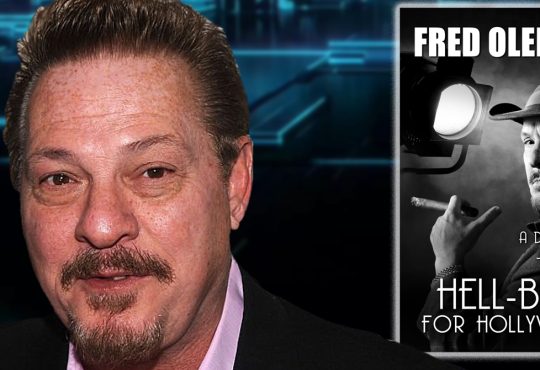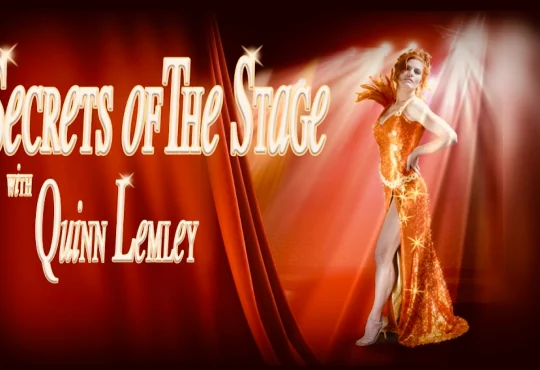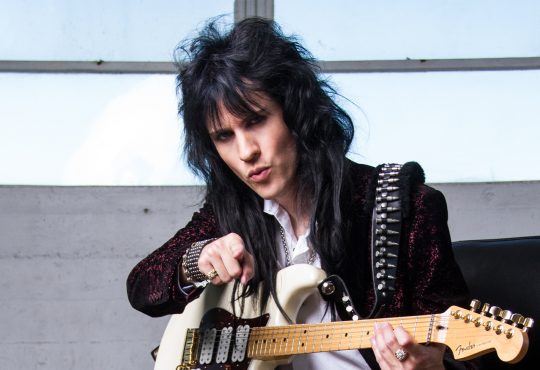The Quiet Confidence of Julia Garner
Last March, Julia Garner shot an all-day subway scene with 400 extras in New York for the upcoming Netflix series Inventing Anna. By the time she took off her wig, she heard production had shut down due to the pandemic. So, she flew home, fell asleep for a month, found two suitcases she hadn’t unpacked since 2018, and for the first time in four years, spent some extended time in her own skin. Which, as pale and platinum-curled and recognizable as that skin is, couldn’t be more different from the characters who’ve made her famous — especially Ozark’s Ruth Langmore, a money-laundering moppet who exhales expletives, assassinates her uncles, and marches through the casino boats of central Missouri in cheap, ruffled blouses that she wears like football pads. As LeBron James once tweeted, “She’s a gangsta!”
In person — or rather, on Zoom from Atlanta, where she’s currently shooting Ozark’s fourth and final season — Garner is cheerful, even-keeled, and cautious. Nothing like Ruth, who hits first and apologizes (almost) never. At 27, a decade after landing a small, but pivotal part in the Sundance-winning drama Martha Marcy May Marlene, Garner savors being too dull to be stalked by paparazzi. She declares herself boring as though waving a white flag that probably doubles as a cozy blanket. Her goal isn’t fame, it’s respect, which can be measured on a scale from appreciative nods on the sidewalk to two consecutive Emmys for Outstanding Supporting Actress.
In the Nation State of Boring, i.e., the Hollywood Hills home she shares with her husband, the musician Mark Foster, and their bulldog, Biz, Garner hibernates and recharges between roles. But onscreen she’s electric, commanding attention despite her tendency to pick characters who listen more than speak. “All of them have a really strong inner voice,” says Garner.
Her body language fills the silence. Where other stars crank up the charm for the camera, Garner creeps into frame like a doe sniffing the wind. A Garner character is underestimated and kicked around, and senses that something imperceptible is terribly wrong. Perhaps her adopted family is a cult (as in her breakout role), or her mother’s aggressively charming new husband will come at her with a knife (Dirty John), or her much older boyfriend is a KGB agent trolling for intel on her CIA-honcho dad (The Americans). Maybe she just needs to get cash from her grandmother for an abortion before anybody finds out she’s pregnant (Grandma). Her girls aren’t big-sky dreamers. They’re ant-farm tunnelers, young women hemmed in by family or fate who grimly make the best of their middling options. And they never smile unless they mean it.
Take Garner’s latest film, The Assistant, in which she plays Jane, the browbeaten underling of a Harvey Weinstein-esque mogul, whose daily routine consists of organizing his box-office reports, unpacking his syringes of erectile dysfunction medicine, and parrying calls from his wife. Jane reacts to her boss’s invective, and his flattery, with honed neutrality. But study Garner’s face — that naturally downturned mouth — and you can see Jane’s motors whirring. Director Kitty Green told her “that she wanted it to be a quiet film,” Garner says, “but the subject is very loud.”
Green intended to shoot The Assistant entirely in wide shots as a tribute to Chantal Akerman’s Jeanne Dielman. But after the first day of filming, she scrapped that plan. “We saw how amazing Julia’s face was on the camera,” says Green. “Every little look, every gesture, the way she moves, just how expressive she was, was incredible and needed to be up close.”
Garner read the script for The Assistant two months after Weinstein’s overdue expulsion from Hollywood. Before then, it probably couldn’t have gotten made. “I mean, it was already a challenge to get made,” Garner says. And that’s without her character even saying the word “rape.” The film is so restrained that Green wrote Jane without an overt personality — an everywoman whose only glint of individuality is a fondness for tacky coffee mugs. Garner’s “inner world is what makes the whole thing work,” says Green. “She is the film. The film does not exist without her. The entire film is written on her face.”
When Jane takes her suspicions to a craven HR supervisor, played by Succession’s Matthew Macfadyen, she can’t bring herself to spell out the sexual assaults taking place 20 feet from her desk. Instead, she raises an eyebrow. He doesn’t get it, or he pretends not to, and for 12 script pages, he cows Jane with counter accusations and threats. The scene is oppressive and static, and at its most agonizing point, Jane lets slip one single tear. Garner did take after take, and every time, there came that tear. Green calls it “genius.”
Ironically, Garner has spent most of her life outrunning a childhood fear that she was, in fact, embarrassingly dumb. Due to a severe learning disability, she couldn’t read until she was 10 years old. Doctors thought she might have a neurological problem. Adrift in the classroom, she struggled to keep pace with the other kids by deciphering their social cues and facial expressions. “I almost had to learn how to act even from that age, act like I knew and I could understand what everybody was talking about,” says Garner. “My whole life in a weird way was prepping me to do what I’m doing now.” To this day, she’s a great mimic. (Google her Britney Spears impression on The Tonight Show.)
Luckily, her family was loving, patient, and creative. Garner grew up in an expressive Jewish household in the Bronx. Her father, Thomas, is a painter and art teacher. Her mother, Tamar Gingold, is a former Israeli sketch comic turned therapist who transformed their living room into an improv stage. When telemarketers called, Tamar would put the phone on speaker and pretend to be the family’s harried Russian babysitter. Everyone leapt into action. Julia was tasked to play a squeaky-voiced brat, or on occasion, a loose bird. “The guy would be like, ‘OK, I’ll call back,’ and he would never call back,” Garner says with a laugh. “Telemarketers stopped calling our house phone.”
At school, however, Garner’s literacy struggles had made her painfully self-conscious. Her parents noted their daughter’s love of classic movies — Fellini, Wilder, Scorsese, they showed her all the heavyweights — and figured an acting class would teach her confidence. At 14, Garner enrolled at the T. Schreiber Studio in New York. At 15, she began to audition for regular-kid roles. A casting director at Nickelodeon tutted, “Honey, you’re great. But you shouldn’t be here.”
They were right. By 16, Garner was on the red carpet in Park City for Martha Marcy May Marlene, fielding questions about playing the youngest victim of John Hawkes’ cult leader. That’s an extreme cure for shyness. Garner shrugs: “Sometimes you need to be pushed into the deep end.”
Martha Marcy May Marlene is better known for being the breakthrough debut of Elizabeth Olsen, who’s since become Marvel’s sparkly suburban superhero, Scarlet Witch. But there’s a portentous moment in the film when Olsen’s character turns to Garner’s to offer some covert, ingénue-to-ingénue advice: “You’ll find your role.”
Easier said than done. Not long after the film’s premiere, Garner, by then 17, flew to Los Angeles, shook a few hands, and got a not-so-subtle hint that she needed to straighten her hair and get veneers. “I quickly saw I’m not going to get those girl-next-door-type roles,” says Garner. She fled back to New York and rededicated herself to independent films. So what if she was too odd to prance around as some teen hero’s flat-ironed girlfriend? Better to be a bold choice by a director willing to, say, cast a Jewish girl from the Bronx to play a fundamentalist Utah Mormon, her first starring role, in the 2012 festival film Electrick Children.
Garner does her homework. To truly understand the inner workings of a Mormon teen, or Ozark’s Ruth Langmore, she writes a diary from their point of view and tries to pinpoint what shaped them as a kid. Her mother has given her stacks of psychology books that Garner calls “super-beneficial in terms of acting.” She describes her characters as real people she’s been fortunate enough to meet.
“I feel like, when a child goes through something, the first heartbreak, they lose their innocence, and they’re stuck at that age,” says Garner. “To me, trauma is trauma. With Ruth, her main thing is she doesn’t have women. She only knows how to be with men. But she’s not with men who respect women, or they’re not good men.” That explains Ruth’s complicated relationship with Marty Byrde (played by Jason Bateman), the first adult man in her life to appreciate her intelligence. “Ruth doesn’t know what a normal and healthy relationship is,” Garner says. “She doesn’t know what unconditional love is.” It’s certainly not what she has with Marty, who feigns that Ruth is his daughter of sorts while keeping her at arm’s length. Some of the show’s most wrenching moments are when Ruth reaches the limits of Marty’s loyalty and finds herself, once again, with no one to lean on besides her own backbone.
“She just so easily communicates vulnerability as well as strength,” Bateman says of Garner. “That’s a real testament to her talent, that she can pull off both ends of that spectrum.”
The day Ruth scored her an Emmy nomination, Garner was late to find out. She’d deliberately put her phone on airplane mode. Sensing she was in denial, Bateman told her to prepare for the fact that she just might win. It didn’t work. On the night of the ceremony, as Garner made her way to the stage, she made eye contact with Michael Douglas and Catherine Zeta-Jones and her brain fritzed. Clutching the statuette, she squawked and shook and gasped and babbled, “This looks like, like, a piece of chocolate with a candy wrapper.”
After that fiasco, charming as it was, Garner figured she wouldn’t win again — not in an all-star category that now included Meryl Streep. So, on a Sunday night last September, with the pandemic forcing nominees to livestream from their homes, she slid into white silk PJs, donned seven strands of pearls, and decided to make a lark of losing in her own home. “A pajama party, but make it Gatsby,” jokes Garner. She won again, and once more broadcast a frenzy of chirps.
Now, Garner fields calls from people who “four years ago wanted me to fix everything about me.” She’s not holding a grudge. But she’s inked her own production deal, so that, like Ruth, she can take care of herself. “She’s got really good taste and a really good ear and a really good eye,” says Bateman. He could see her stretch into character-driven comedies, perhaps something by David O. Russell or Christopher Guest. “I’d like to see her put her hand up for some of that work, because I think she’d be fantastic.”
Garner is ready to get a tad more playful. Next up, she’s starring as Anna Delvey, the infamous scammer socialite who bilked a subset of Manhattan’s elite out of hundreds of thousands of dollars, in Shonda Rhimes’ Inventing Anna. Garner visited Delvey — real name Anna Sorokina — in prison, where she’s serving a four-to-12-year sentence for larceny, to solve the riddle of a working-class Russian girl who repackaged herself as a billionaire German heiress. But she found someone secretive and vague. “Anna doesn’t even know herself, and it’s really hard to play someone who doesn’t know themselves,” Garner says. “My roles just get harder and harder the older I get.”
“I always say, ‘Maybe this will be easier,’” she continues, reflecting on the career she’s building. But does she really want that? “No,” she says, laughing. “If I hear that a part’s going to be hard, I’m like, ‘That sounds terrifying, that sounds terrible.’ And then I’m like, ‘I’m doing it.’”







